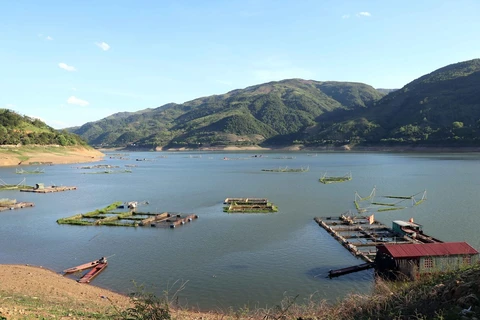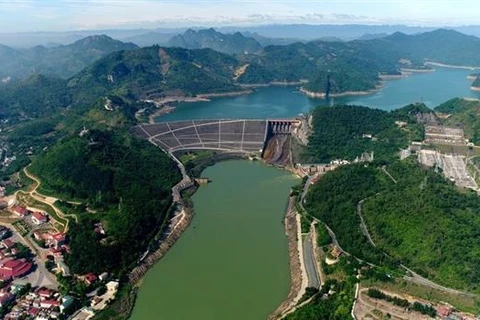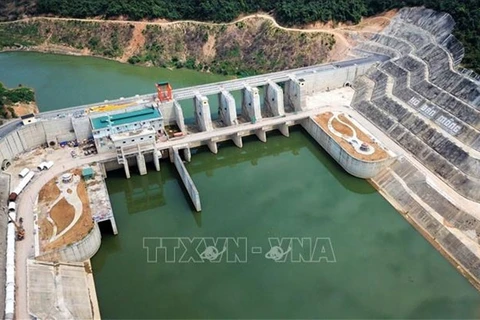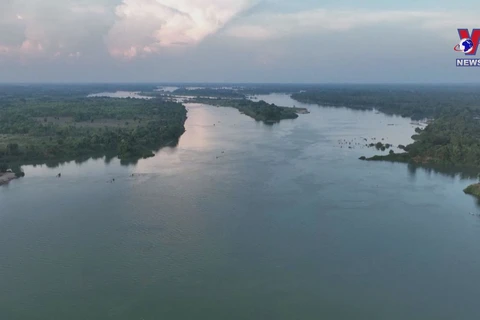Hanoi (VNA) - The Mekong Delta is facing numerous challenges in the utilisation of water resources within the Mekong River basin, exacerbated by factors such as sea level rise, subsidence, landslides, drought, and saline intrusion.
To ensure water security for the country’s largest rice bowl, it is imperative to come up with a comprehensive management solution.
Nguyen Hong Phuong, Deputy Chief of the Standing Office of the Vietnam Mekong River Committee, said as almost 95% of the river’s flow originates from upstream countries, the Mekong Delta is highly susceptible to fluctuations caused by developmental activities, particularly the construction of hydropower projects in the upper part of the Mekong River.
The ongoing exploitation of water resources in the Mekong river basin have seen more complicated developments, with upstream countries accelerating the implementation of hydroelectric and irrigation projects to serve their socio-economic development goals.
In recent years, these fluctuations have grown more erratic, leading to adverse consequences for the Mekong Delta, Phuong stated. These include extreme flooding and drought events, heightened saltwater intrusion, ecological degradation, and the depletion of aquatic resources.
Additionally, there has been a surge in riverbank and coastal erosion, severely impacting economic activities and endangering the livelihoods of millions of people, especially those who are impoverished and depend on the Mekong river’s water resources.
Phuong cited data indicating that the average rainfall during the dry season has decreased by 10-30% since 2010. Some years have witnessed severe droughts, such as those experienced in 2016 and 2020. Coupled with rising sea levels, these conditions have resulted in escalating saltwater intrusion, reaching approximately 20-25 kilometres further into the river compared to the average levels of previous years.
Phuong emphasized that the 2015-2016 drought and saltwater intrusion alone caused an estimated damage of around 5.5 trillion VND (over 224 million USD).
 The Mekong Delta continues to see complicated developments in the utilisation of water resources in the Mekong river basin. (Photo: Hung Vo/Vietnamplus)
The Mekong Delta continues to see complicated developments in the utilisation of water resources in the Mekong river basin. (Photo: Hung Vo/Vietnamplus) Mai Van Khiem, Director of the National Centre for Hydro-Meteorological Forecasting, said the Mekong Delta localities should devise specific plans and solutions to ensure sufficient water for crop production in the upcoming 2023-2024 winter-spring season, while minimising the damages caused by drought and saltwater intrusion.
Furthermore, Phuong suggested key measures such as developing policies that encourage investment in water security, promoting efficient and economical use of water resources, and establishing multi-purpose irrigation infrastructure systems.
 Locals in the Mekong Delta are struggling with drought, saltwater intrusion. (Photo: Hung Vo/Vietnamplus)
Locals in the Mekong Delta are struggling with drought, saltwater intrusion. (Photo: Hung Vo/Vietnamplus) Vietnam should also enhance its early warning capabilities regarding the water resource situation in the Mekong Delta and raise community and public awareness.
In terms of international cooperation, Phuong suggested that Vietnam continue to collaborate with the member countries of the Mekong River Commission to effectively implement the Mekong Agreement, ensuring the sustainable, equitable, and rational management and utilisation of water resources.
Strengthening cooperation with basin countries through bilateral and multilateral channels, particularly the International Mekong River Commission and the Mekong-Lancang Cooperation mechanism, is also recommended./.
























